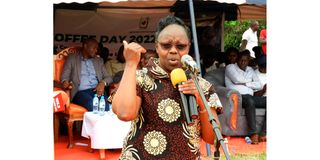Why women want to have a voice in war on banditry

Dr Yulita Cheruiyot, the Nandi Deputy Governor. She regretted that women have been acting as spectators as banditry continues in the North Rift region.
What you need to know:
- The North Rift region is grappling with insecurity and women leaders want to be part of the conversation seeking solutions.
- They say past interventions have been dominated by men, yet women and children bear the brunt of raids on homesteads.
Women from the North Rift Economic Bloc (Noreb) now want to be involved in plans against banditry.
The region is grappling with insecurity and women leaders want to be part of the conversation seeking solutions, saying past interventions have been dominated by men, yet women and children bear the brunt of raids on homesteads.
Nandi Deputy Governor Yulita Cheruiyot regretted that women have been acting as spectators, saying the time has come for them to be involved in search of peace.
“As women, first we are mothers and second we are wives to these boys and men. We are the ones who cook for them and if there is any influence, it is us. But we need our voice to be heard, thus we should be brought to the table and involved in the conversation. That is what we are asking for,” she said in Eldoret.
“Most of the times when the government brings the military and other security agencies to quell the insecurity menace like what is happening now, much of it is a conservation between men. And what we are asking ourselves is where the voice of women is in all this.”
Widows
Regarding those widowed by banditry, Dr Cheruiyot said they have not done a survey to understand the scope and how to support them to stand up to provide for their families. She said under the leadership of Nandi governor Stephen Sang, who is the Noreb chairperson, they have come up with a peace conference in Trans Nzoia that would bring together the eight counties under the bloc.
“Five out of the eight counties that form Noreb are grappling with insecurity, thus the need for the peace conference. Leaders, the clergy, development partners and other organisations will come to a conversation table in an attempt to look at the situation, where we are and identify the gaps.”
She said the conference will culminate in a taskforce with a report to be presented to President William Ruto as part of solutions to the menace that has bedevilled the region for long.
“On Friday last week, we had a pre-conference bringing together all the gender technical teams from the eight counties to see how we can domesticate the UN Resolution 3025 that talks about involving women in peace, conflict and security issues,” Dr Cheruiyot said.
She said the region is also facing serious incidents of gender-based violence, another reason to have their voices heard.
“We want to let out voices to be part of finding solutions. This also is part of education, sensitisation, capacity building and support for women to speak up because we have to recognise the fact that unless we hear we will not know what is happening,” said the deputy governor.
“In my community, we say if you keep quiet you eat the product of silence and we have witnessed that over time. It is high time our voices came to the table so that our perspectives, contributions and thoughts shape the decision taken to handle the situation in Kerio Valley and the region.”
She said they have also stepped up the fight of HIV/Aids and STI, which is increasing in the region.
“As counties we, working with the Ministry of Health, have organised forums for sensitisation to the triple threat: HIV/Aids, teen pregnancies and SGBV. Let’s come to the table and talk to each because none of us is immune. None of us is safe until everyone is safe,” she said.
Former Cooperatives minister Linah Kilimo, who is in the gender technical team, said banditry is hurting families and they fully support government efforts to restore security in the North rift.
“How I wish we could really stop these killings in Kerio Valley because we are increasing the number of widows and orphans. The killings are so costly to many families in the region,” Kilimo said.





